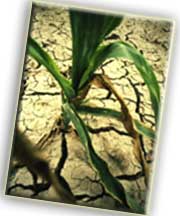 |
|
-August 2005- |
|
Dog Days of Summer
In recent news, attention has focused on worldwide water supply shortages from this summer's extreme heat and low rainfall. We'd like to share in these water conservation sentiments, drawing attention to the water shortages happening right at home and what we can do about it. Though not to Niger's or Eastern Europe's catastrophic level, Illinois' drought has caused losses to many--so much so that our Gov. requested federal disaster aid to all 102 counties in Illinois.
What is the cause of our drought? Rain levels between March and June 2005 have been low--not this low since 1852*. While Illinois is generally blessed with abundant water sources, water availability varies greatly throughout the state. Combined with varying rain levels, the drought has been most severe for western parts of Illinois and has expanded to connect with Missouri.
What can I do? Knowing that levels of severity differ throughout the state, we ask that you send this email to your friends and family so that they too may know how protect their water supply. Also, check out our guzzler bookmarks that give tips on how to conserve waters indoors.
Facts**:
- The average daily household uses 180 gallons of water per day.
- About 20% of all toilets leak.
- During the summer months, up to 50% of an average family's water consumption is used on landscaping.

Tips to follow to do your part to conserve water:
- Check to see if your toilet leaks by putting a few drops of food dye in the tank. After 15 minutes, if color appears in your bowl, you have a leak that should be fixed.
- Install water efficient faucets.
- Use rain barrels to capture runoff from your roof during a storm. This free water can then be used to water plants and gardens instead of using water from the faucet.
- Minimize watering your landscape.
- Wash clothes only during full loads.
- Mulch your plants to reduce soil evaporation and prevent weeds from growing and competing for water with other plants
To see how droughts are monitored, visit here.
Learn how to create your own rain barrel.
*http://www.epa.gov/water/you/chap1.html
**Facts taken from the American Water Works Association's website at www.awwa.org